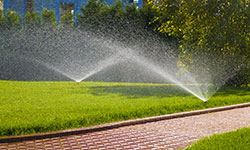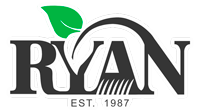Smart Irrigation Saves You Money
July is Smart Irrigation Month, making now the perfect time to explore how an irrigation system can help you not only keep your lawn looking healthy, but also conserve water and keep your utility costs low.
Get A Smart Start
 When you first consider your irrigation system, it’s important to make sure that it will be designed to code and installed correctly. To ensure this happens, hire a certified or licensed irrigation professional who knows the weather conditions of your area and how to keep your system working at an optimal level. Once installed, your well-designed system will be equipped to help you achieve the perfect watering levels for your grass and the level of rainfall.
When you first consider your irrigation system, it’s important to make sure that it will be designed to code and installed correctly. To ensure this happens, hire a certified or licensed irrigation professional who knows the weather conditions of your area and how to keep your system working at an optimal level. Once installed, your well-designed system will be equipped to help you achieve the perfect watering levels for your grass and the level of rainfall.
Make Some Plans
Doing a little up-front planning can help guarantee long-term satisfaction with your irrigation system. If you’re doing any planting, group plants with similar water needs together and separate planting beds from regular lawn areas. Plan where the zones for your irrigation system are located and make sure your system has enough capacity now and in the future to keep your lawn properly watered.
You’ll also want to check your local water pressure and select the appropriate sprinklers for your lawn. Include “smart” controls in your irrigation system to allow your system to automatically adjust itself according to rain, soil moisture, evaporation, and plant water use. Using quality components when installing your irrigation system can help prevent and minimize future maintenance needs and keep your lifetime cost low for your system.
Create A Smart Schedule
Schedule your irrigation zones to be properly watered depending on sun, shade, and wind exposure. Using your smart controls, you can make adjustments at any time and account for the amount of rain your lawn is experiencing throughout the year. Set your sprinklers to water plants and grass and not your driveway, sidewalk, patio or home. Pay attention to the time of day that you are watering your lawn to minimize evaporation and keep your lawn healthy. Water each zone for shorter periods to keep them healthy and prevent over watering if they are already getting nutrients from rain.
Taking even a few of these steps can help you save money throughout the summer as you regulate your water use on your lawn and don’t over water or need a maintenance repair. To learn more about smart irrigation practices, visit SmartIrrigationMonth.org.
Have a question about your irrigation system or whether or not you should get one? Leave a comment below or give us a call at 913-381-1505.









